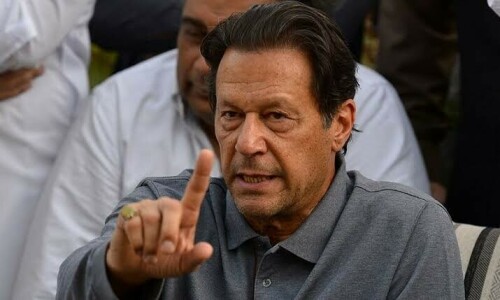HE is deep-frying potato fritters whilst nestling a cell phone between his ear and shoulder. Hussain prepares food for his employers as he talks to his wife back home in Dhaka, waiting eagerly to see his two-year-old daughter on Skype.
Hussain has seen his daughter virtually only. He first came to Pakistan in 2002 to work as a cook, after leaving his job in a garments factory in Dhaka. But since his wife gave birth to their daughter, his attempts to acquire a visa for Bangladesh have been futile.
Hussain entered Pakistan on a two-month tourism visa, found a job and, like many others, stayed back on. He decided to get a Pakistani identity card, but was unable to produce a birth certificate. So, he resorted to the effective but illegal method: he offered Rs10,000 to a middleman who got the job done. Soon after, he managed to get a passport made in a similar way. For many years, Hussain managed to visit his family in Dhaka periodically. But for over a year now, along with many of his Bangladeshi acquaintances, he has been facing rejections by the Bangladesh embassy.
“Sheikh Hasina’s government has a problem with Pakistanis,” claims Hussain. “Even though I am Bangladeshi, in the official system I am Pakistani. That is why the embassy is not issuing me a visa.”
According to a representative of the Ministry of Foreign Affairs in Pakistan, Sheikh Hasina’s government harbours anti-Pakistan sentiments. “Since last year, Bangladesh has been executing leaders of Jamaat-i-Islami (JI) for war crimes during the 1971 conflict. Every time she [Hasina] executes more people from the JI, she propagates the war,” he adds.
Where tourist visas are largely being rejected, at times even diplomats are denied admittance by the country. However, according to the representative, Pakistan’s Foreign Office has been using a reciprocal policy where it bars Bangladeshi diplomats from entering Pakistan too, when Bangladesh rejects her officials.
Last year, in a diplomatic row between the two countries, Pakistan withdrew a diplomat at its high commission in Dhaka, after Bangladeshi authorities accused him of spying and being involved in financing Islamist groups. In January, a Bangladeshi diplomat in Pakistan was expelled in what Dhaka officials labelled an act of retaliation.
Over three million people from Bangladesh live in Pakistan. Thousands migrated to the country after the 1971 war and many were given legal status by the government. But those like Hussain, who came later to find work and overstayed their visas, became illegal.
They are easily identified as Bangladeshi because of their distinct accent, often having to dodge officials who demand birth certificates and other official documentation. Many do not open bank accounts due to the lack of such paperwork, and send money to their families through agents, by hand, giving them a commission.
With the modest earnings of any domestic cook in Pakistan, Hussain sends 5,000 Bangladeshi takas to his wife and another 5,000 to his parents every month. He moved to Karachi after his brother and cousins told him they were able to earn much more here. But now, with the rupee depreciating against the Bangladeshi taka in recent years, he does not find it lucrative to continue working in the country and wants to return to Bangladesh.
The deputy high commission of Bangladesh in Pakistan, however, declines to accept the predicament of people such as Hussain, and states: “To the best of our knowledge, there is no illegal Bangladeshi in Pakistan. The visa policy for every country changes from time to time. Visas are issued in accordance with due procedure.”
Pakistan’s alleged links to terror networks has also made visa issuance a nuisance for most of its citizens; according to many indices, the Pakistani passport is an adverse travel document.
“Sheikh Hasina represents the political forces that were at the forefront of the liberation struggle by the then east Pakistanis, who sought and welcomed Indian intervention,” says Raza Rumi, political analyst and author of Delhi by Heart. “The recent spate of killings in Bangladesh is being linked to the South Asian branch of Al Qaeda and some link that to the havens found by terror groups in Pakistan in the past. Therefore, the current Bangladeshi government can use this for intensive screening of people coming from Pakistan.”
“I feel trapped and don’t intend to reapply for a visa,” states Hussain meanwhile. “I will be wasting money on paying the fees. I have watched my daughter grow on Skype over the last two years, missed two birthdays and many Eids. I look Bangladeshi, I speak Bangla, and anyone who meets me can tell I’m not Pakistani, but I’m stuck here.”
Published in Dawn, August 21st, 2016












































